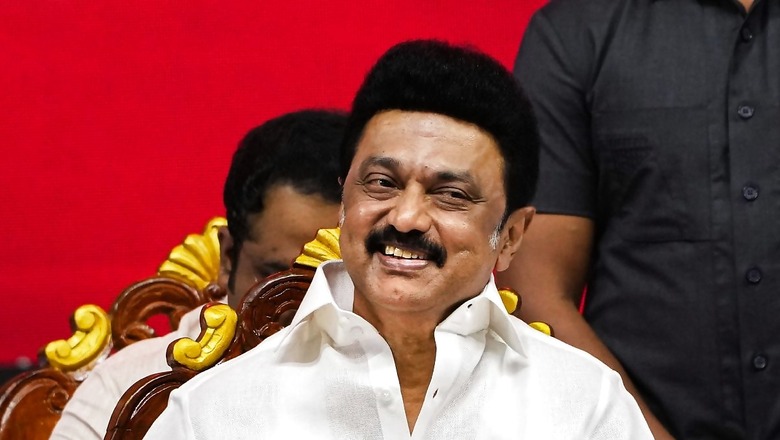
views
Tamil Nadu Chief Minister MK Stalin has alleged that the Centre was withholding funds from Opposition-ruled states for the Samagra Shiksha Scheme (SSS) and criticised the new National Education Policy (NEP). He cited a news report, which he shared on X (Twitter), that said some top-ranked states were being denied funds by the Centre for the education scheme.
Education minister Dharmendra Pradhan responded to Stalin’s allegations by criticising him for creating divisions among states over the implementation of NEP. Though Pradhan acknowledged “healthy competition” among states, but warned against “pitting states against each other to make a point”, in a statement on X.
What Is It That The TN Government Is Opposed To?
It has much to do with the Opposition states’ unwillingness to implement the Centre’s PM-SHRI scheme, and more so for the words ‘PM’ and ‘NEP’ in essence.
Even as the Tamil Nadu government has been opposed to several facets of the NEP, including three-language formula and teaching in mother tongue, and was one of the Opposition-ruled states, which had not accepted the PM-SHRI (PM Schools for Rising India) scheme until early this year, it was in July that it gave an undertaking to the education ministry saying that it is ready to sign an MoU with the Union government to implement PM-SHRI, News18 has learnt.
According to officials in the know, when the draft was sent to the Tamil Nadu government’s education department for the said MoU, it came back as a modified document seeking to remove the word ‘NEP’ from it. “They gave an undertaking with regard to implementing the PM-SHRI scheme and sign an MoU with the government for the same, but with a rider that NEP be removed from it. The MoE (Ministry of Education) responded by requesting the state education department to accept it as a whole since PM-SHRI is a tool to showcase the objectives of NEP and hence, cannot be removed from it,” said an official familiar with the matter.
TN government officials said they have not received funds under the Samagra Shiksha Scheme (SSS) for the first quarter of this year so far. They have been told by the ministry that since funds under SSS are for entire funding for school education, of which PM-Shri is a part, they cannot receive the funds unless they implement all objectives under the scheme.
PM-SHRI is a scheme that aims to develop exemplar model schools that provide leadership to other schools in every block in each district across the country. The scheme was announced in the Union budget 2022, seeking to develop 14,500 PM-SHRI schools across India, which will showcase each of the objectives envisaged in the NEP, 2020.
NEP outlines objectives for pre-primary, primary, secondary and senior secondary education in schools such as setting up of Bal Vatikas, teaching in mother tongue at primary stage, a three-language formula (one foreign and two Indian languages), introduction of vocational education and developing skills in the senior stages, among others. Many of the Opposition-ruled states have been opposed to the new policy since it came out in 2020. Also, since education is a subject in the concurrent list, states are not bound to accept the national policy.
How SSS and PM-Shri Are Linked
Samgara Shiksha Scheme is an overarching programme for school education to implement the Right to Education (RTE), Act 2009. The Centre is supposed to fund 60% of the scheme while states have to bear 40% of the expenses under the scheme except for the northeastern states and Union Territories (without a legislature), which have a larger share of central funding. It includes funding for teachers’ salaries and all other expenses for school activities.
Since SSS was designed in 2018 by the BJP government and the NEP was developed in 2020, the former was aligned with the New Education Policy in 2021. A draft regarding this was sent to all states, and according to ministry officials, none of the states raised any objection to it then. In 2022, the PM-SHRI scheme was announced and incorporated under the SSS. States are required to confirm their participation in PM-SHRI by signing a Memorandum of Understanding (MoU) with the education ministry.
Five Opposition-ruled states including — Tamil Nadu, Kerala, West Bengal, Delhi and Punjab — are yet to sign the MoU with the education ministry until now. While Tamil Nadu and Kerala had indicated that they are willing to implement the scheme, they are yet to do the same. Until early this year Delhi, West Bengal and Punjab had outrightly refused to implement the scheme, following which SSS funds were stopped to these states.
Some of these states like Delhi and Punjab already follow similar schemes such as ‘Schools of Excellence’ and ‘Schools of Happiness.’ Reportedly, these three states were not given funds under the scheme for the last financial years’ October-December and January-March quarters as well as for the current year’s April-June quarter.
Delhi & Punjab Agree To Sign MoU, West Bengal Says No
Facing fund crunch, the Punjab government had said last month it is ready to implement the PM-SHRI scheme and will be signing an MoU with the ministry soon. Similarly, a few days ago, the Delhi government told the ministry that it will be implementing the scheme and sign the document for the same, News18 has learnt. Both Delhi and Punjab governments are led by the Aam Aadmi Party (AAP).
“Both, Delhi and Punjab governments have agreed to signing of the MoU recently. Punjab has even identified schools for the same,” said a second official in the know.
However, the West Bengal government is still to come on board. Officials said they sought to remove the word PM from the scheme in order to implement it, but nothing has come formally from the state education department on this.
















Comments
0 comment